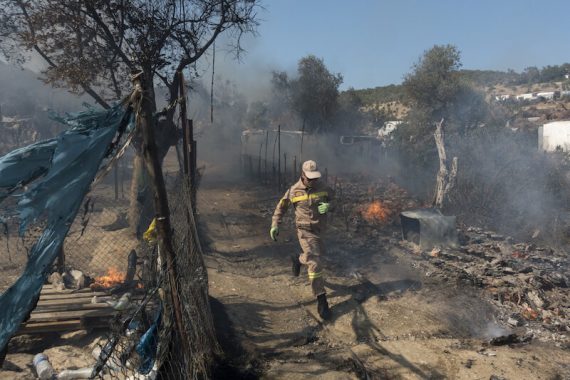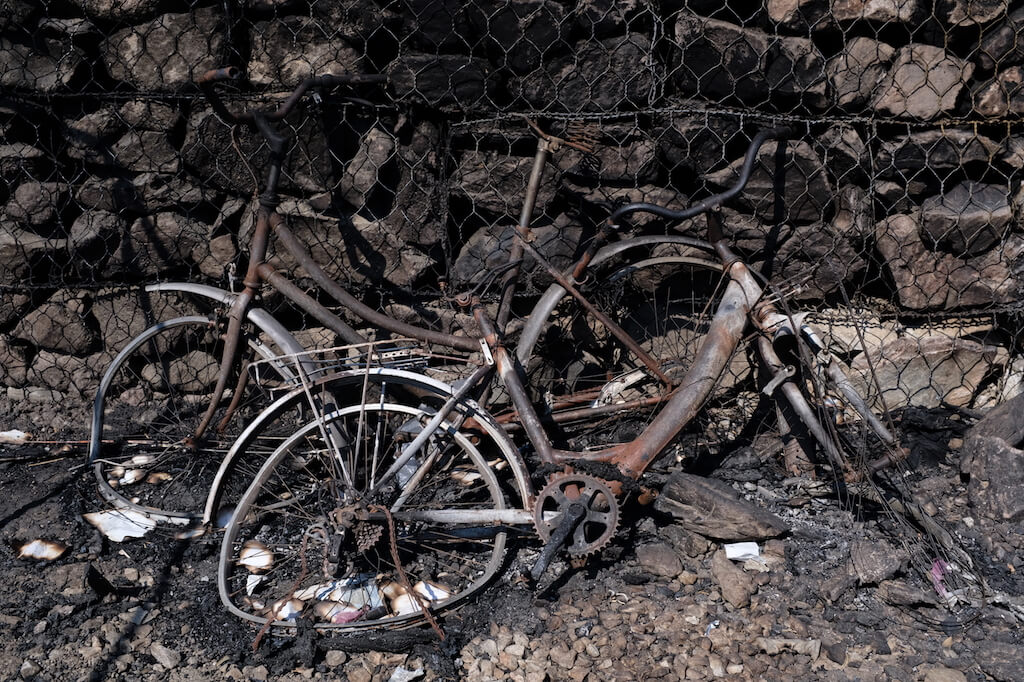The Euro-Mediterranean Human Rights Monitor issued a statement on Wednesday, November 4, 2020, stating that Greek refugee camps lack the minimum standards for human life, and that refugees and asylum seekers are forced to endure unbearable conditions which in turn “poses serious risks to their physical and mental safety and well-being.”
The Geneva-based organization noted that Greek refugee camps are “dangerously unsustainable” and that refugees and asylum seekers face an imminent threat to their lives.
A fire broke out recently at Vathy refugee camp on the Greek island of Samos. The camp is home to 4,500 refugees and migrants who are overcrowded in a building that only fits 650 people. Greece’s Ministry of Migration and Asylum claimed that the fire that caused the burning of 15 tents at the camp caused no injuries, adding that at least 150 people were rendered homeless. The cause of the fire is still to be determined.
Euro-Med Monitor noted in the statement that in September alone, two other fires broke out in the same camp, as the island was hit by a 6.7-magnitude earthquake causing a mini-tsunami, which also hit the Turkish city of Izmir.
Since the outbreak of the crisis in Syria in 2011, millions of refugees have made it to Europe, whereas Turkey still hosts the largest number of the refugee population with more than 3.6 million Syrians, according to the UNHCR. Despite the promises of the EU-Turkey refugee deal of 2016, the EU has failed to share the responsibility of the refugee influx. Many of these refugees decide to take the dangerous Mediterranean route to the EU through the Aegean Sea, where they end up on Greek islands. Refugees have repeatedly made calls to provide them with the minimum living conditions including clean water, food, and accommodation. Greek refugee camps are fully crowded and the Vathy fire is not the first of its kind.
Not only this, Doctors Without Borders have noted that more than 100 residents of the camp have tested positive for COVID-19. Despite this, refugees still lack proper access to healthcare and live in a continuing lockdown without access to the outside world.
“The fire has once again revealed how desperate and unsafe the situation in Greek refugee camps is,” said Michela Pugliese, legal researcher at the Euro-Med Monitor. “The restriction of movement, the overcrowding, the lack of proper infrastructure, the rise in COVID-19 cases, and the unhygienic and inhumane conditions of Vathy camp make such an outcome predictable.”
Pugliese added that the dire conditions at Vathy camp, which only got worse with the outbreak of the fire, violate international human rights law, including the right to adequate housing and health, which is also stipulated in the Universal Declaration of Human Rights (UDHR) and the International Covenant on Economic, Social and Cultural Rights.
Article 25 of the Universal Declaration of Human Rights asserts, “Everyone has the right to a standard of living adequate for the health and well-being of himself and of his family, including food, clothing, housing and medical care and necessary social services, and the right to security in the event of (…) lack of livelihood in circumstances beyond his control.”
Recommended
Euro-Med Monitor concluded by calling on Greece “to immediately close Vathy camp and other similar overcrowded, unsafe and unsanitary camps in the Aegean islands and transfer the asylum seekers to adequate accommodation centres in Greece or in other EU states.”
Euro-Med Monitor called on the European Union “to respect, protect and fulfill international and regional law concerning asylum seekers and migrants’ rights.” The Geneva-based organization concluded by reminding the EU that Article 17.2 of the Directive 2013/33/EU lays down standards for the reception of refugees who lack protection and calls on EU member states to “ensure that material reception conditions provide an adequate standard of living for applicants, which guarantees their subsistence and protects their physical and mental health.”
In late September, an UNDP representative hailed Turkey’s decision to grant Syrian refugees access to healthcare during the COVID-19 pandemic. Claudio Tomasi, representative of the United Nations Development Programme told Anadolu News Agency, “As we highlight in our joint report, Turkey stands out compared to other countries, as early on it adopted a comprehensive policy framework to grant Syrians under temporary protection not only access to services but also to the labor market.”






